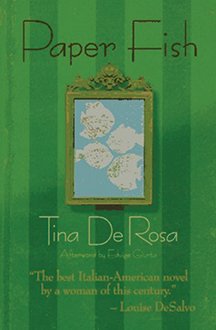Memories from a Lost World
In Tina De Rosa’s marvellous novel Paper Fish, the long-neglected voice of a whole generation of Italian-American women at last speaks out
by Laura GIACALONE
It happened almost by chance. A small Italian publisher handed me this little book called Paper Fish and told me to give it a read, to see if it was any good. The moment I opened the book I knew that something had happened inside of me. I was overwhelmed by a sort of interior smile, that kind of happiness that comes when you discover something really precious, something you didn’t even know you were looking for. That was the start of my love for Tina De Rosa and of my career as a translator.
Originally published in 1980 by a defunct publisher of New York, and reprinted by The Feminist Press after years of oblivion, the book was finally released in Italy as Pesci di carta in 2007, a few months after the author’s death.

Set on the West Side of Chicago during the 1940s and 1950s, Paper Fish tells the story of an Italian American family through the eyes of its little heroine, the eight-year-old Carmolina, who gets lost in the suburbs breaking the precarious balance of her family. The individual story of Carmolina’s family becomes representative of the collective experience of the Italian immigrants in America, torn between the values of tradition and the inhuman habits of the New World urban environment.
Far from any cliché, Tina De Rosa recalls the lost world of Little Italy without falling into the traditional portrait of the cheerful and noisy Italian American family, also avoiding the stereotyped visions promoted by The Godfather and Goodfellas movies. She rather drags her characters into a territory free from prefabricated categories, where the power of imagination reigns supreme.
She fills her novel with great inimitable characters, whose heroism lies in their silent and tragic humanity. From little Carmolina to Grandma Doria, storyteller of a mythical past, all the protagonists of the book are humble and taciturn figures, with an extraordinary human dignity. Their eyes are sad, lost in the void, and rarely meet. They are all locked in their own solitude, haunted by their nostalgic memories, trapped in a daily routine made of repeated gestures of antique fascination. They are graceful and frail figures, “as beautiful and fragile as a Japanese kite”, said the award-winning novelist explaining the meaning of the title.
With an impressionist style, which magically blends the linearity and simplicity of prose with the lyrical suggestions of poetry, Tina depicts her characters with intense and quick strokes of light, composing the fragments of the story as pieces of a puzzle, where past, present and future become simultaneous occurrences, and tangle in a mythical timeless dimension.
With a hypnotic language rich in nuances, the author dwells upon daily little gestures and describes them with the marvel of a child who looks at the world for the first time.
Giving voice to her characters, De Rosa turns the “broken” English of the immigrants into poetry, paying a tribute to a whole generation of Italian American women who have long been trapped in cultural stereotypes and relegated to the margins of history and literature. With Paper Fish they finally speak out, and their voice is something magnificent that won’t be easy to forget.
<a href=”http://italianjournal.it/contributors/laura-giacalone/” target=”_blank”>Laura Giacalone</a> is the Associate Editor for the <em>Italian Journal</em>.
